Chairman and group chief executive officer of Oilserv Group, Engr. Emeka Okwuosa, has appealed to the African Export-Import Bank (Afreximbank) to increase financial support for African companies providing engineering, procurement and construction (EPC) services to boost infrastructural development and reduce capital flight.
Okwuosa made the appeal at a panelists’ session at the ongoing Intra-African Trade Fair (IATF) 2023 in Cairo, Egypt, tagged: ‘The Challenges, Opportunities and Solutions for African EPCs – Perspective of the EPCs.”
He said having access to cheap funds would enable more African companies to compete for EPC-related jobs within the continent and beyond.
There are indications that Africa loses more than $50 billion yearly to capital flight due to foreign firms’ participation in the execution of EPC-related contracts in the continent.
He asserted that except African EPC companies are able to access more funds, the continent cannot compete well with the rest of the global economy.
Stressing the critical role of funds in infrastructure development which leads to economic transformation, he said, “When we talk about finance and funding, for us in the oil and gas sector, we have a success story of the ongoing construction of the AKK pipeline at $2.4 billion”
On how and why Afreximbank should drive the process, he said, “The issue of funding is not about access, but cost of the funds. Most African countries are not in position to access funding in a way to be able to compete in terms of cost of the funds relatively compared to the Chinese companies. This is because if you are bidding for an EPC contract and the cost, apart from your ability to execute in terms of your technical capacity, the cost enables you to win and execute the project profitably.
“Competing with the European, Chinese companies is quite difficult because at the end, the margin of an African companies does not come close to competing with the financial muscles of the Chinese which often than not does not build indigenous capacity but rather giving way to capital flight which are repatriated to develop their countries rather than injecting such in Africa.
“I believe, the AfreximBank should step up and create more access to funding for African EPC companies, and at a good rate because that is the only avenue capacity can be built. Also, we are looking at Afreximbank to solve problems and there are ways to go about it.
“When we talk about financing, from placement of guarantee for a billion dollar project, the Chinese would present less than the budget because it’s being backed by their government. Afreximbank can leverage on its position of strength and be able to work with other financial institutions across African countries like the NEXIM banks of these countries.
“I will take into account the African Continental Trade Agreement and I’m sure there are some protocols that can be taken into account for a better synergy to be able to provide the basis for a more competitive financial system for such projects by Africans which will make a lot of difference.
“However, when you talk about Chinese and others coming in to run a project, they come in with finance at a cheap rate. However, these funds are been met with difficult conditions and part of which would be that minimum involvement of local content to provide finance for labour, materials and equipment. If Afreximbank can take up the challenge, the value system will be improved.
“Another challenge is the ease of moving labour across Africa as well as building up local content. When we tackle these challenges very well, capacity will be built. The ease of moving labour in Africa is very poor. For instance, Nigeria has, to a greater extent, grown capacity but the ease of navigating this capacity across Africa is not too welcoming and seems impossible. This should not be so as we can grow the capacity of Africans for Africa development.”
On his part, the chief executive officer, Elsewedy Electric, Ahmed Elsewedy, frowned at the current inconsistency in the political system in Africa, as many projects are either delayed or frustrated by the system.
He said, “The political uncertainty in Africa has made it challenging for EPC projects. For instance, in a switch from a government to another after an election, oftentimes, projects are dragged backwards thereby, undergoing renegotiation. This process can sometimes take more than two years to be approved. That alone is a major setback to the EPC projects across Africa and this does not look good, but because we are ready to work, most times we continue with the project despite being unattractive and profitable anymore.”
On capital flight, he added that “capacity is never achieved when the projects are contracted to the Chinese or European companies. Africa has the capacity and the idea of taking the money back to China or Europe to develop, is a system and challenge that will never grow capacity.”
Speaking on the challenges faced by EPC’s companies in Africa, another panelist, Hassan Allam, the chief executive officer of Hassan Allam Holding, identified infrastructure deficit, lack of funding as the bane of the sector.





